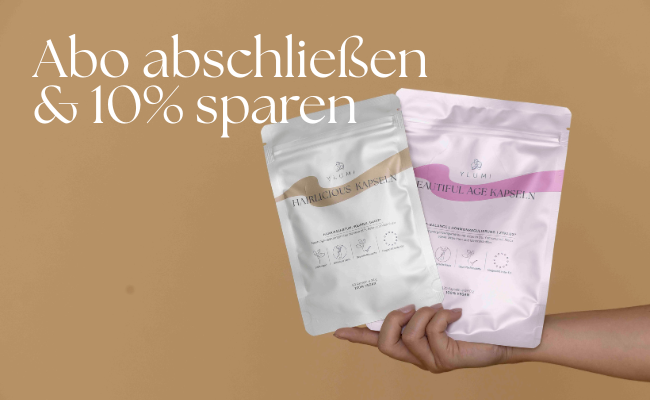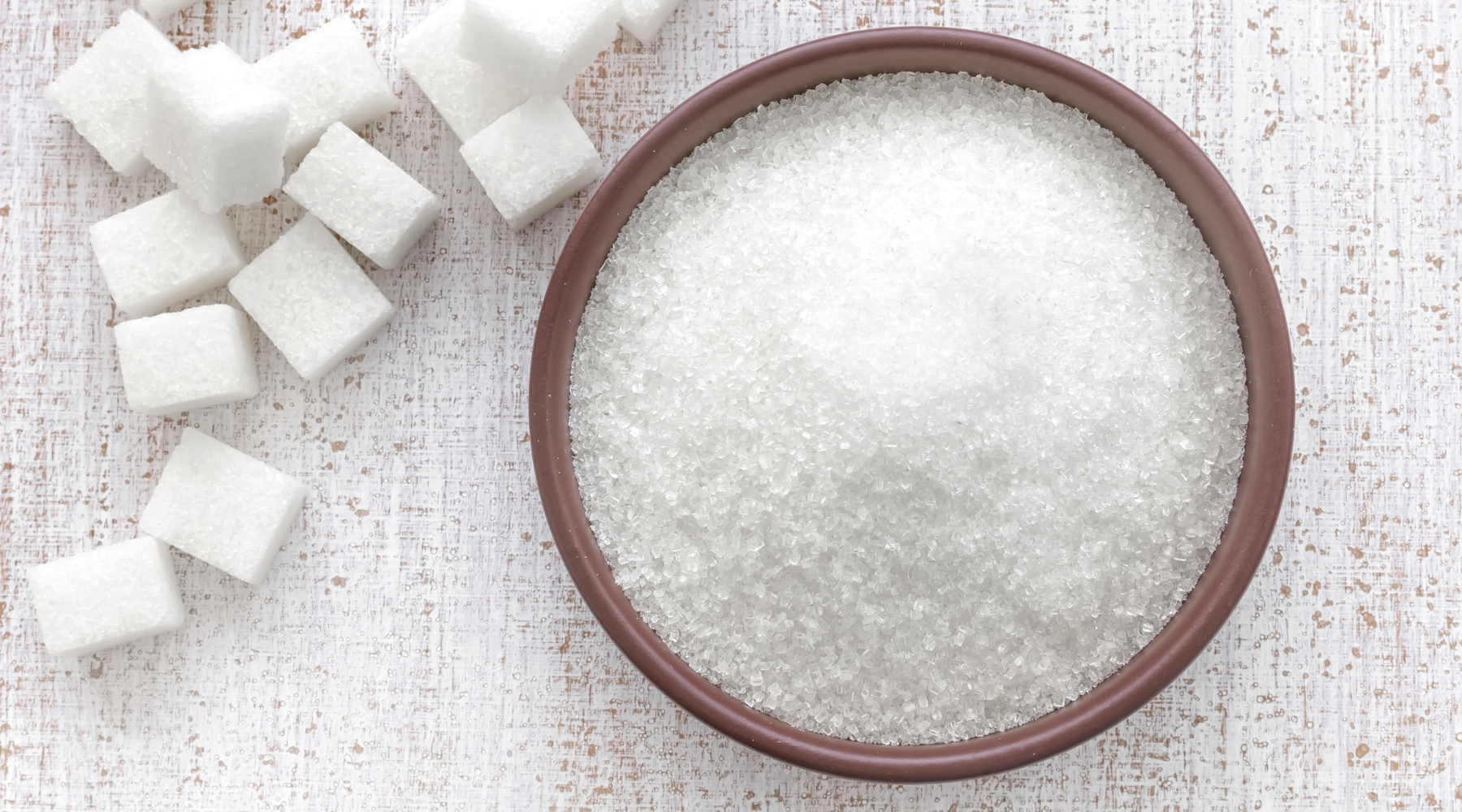
STOMACH PRESSURE AND FULLNESS: SYMPTOMS AND WHAT YOU CAN DO
CONTENTS
- Stomach vs. intestines – what’s the difference?
- Sensitive gastrointestinal tract: 6 typical signs
- Signs of a sensitive gastrointestinal tract
- Causes of stomach pressure and bloating
- Our top 5 tips for relieving stomach problems
- YLUMI: Special digestive complex can provide relief
STOMACH VS. INTESTINES – WHAT'S THE DIFFERENCE?
While stomach complaints refer to discomfort that occurs in the stomach region, intestinal complaints refer to problems of the intestines. The stomach is an organ located in the upper part of the abdomen and plays an important role in the digestion of food. Typical stomach complaints can include nausea, vomiting, heartburn, stomach pain, bloating, and belching.Stomach problems can be caused by various factors such as
- Unhealthy diet,
- Stress,
- infections or
- Diseases of the stomach itself are caused.
The intestine is a long tube located in the abdominal cavity and consists of the small intestine and large intestine. It is responsible for digestion, nutrient absorption, and excretion.
Typical intestinal complaints can include
- flatulence,
- abdominal cramps,
- Constipation,
- Diarrhea and
- Changes in stool.
Intestinal problems can be caused by various factors such as an unbalanced diet, an imbalance in the intestinal flora, inflammatory bowel disease or irritable bowel syndrome.
It's important to note that stomach and intestinal problems can have similar symptoms, as the stomach and intestines are closely connected. If you experience recurring or persistent symptoms in these areas, it's always advisable to seek medical advice to identify the exact cause and receive appropriate treatment.
SENSITIVE GASTROINTESTINAL TRACT: 6 TYPICAL SIGNS
A sensitive gastrointestinal tract can exhibit various symptoms and signs that indicate intolerances, irritations, or disorders in the digestive system. Here are six typical signs of a sensitive gastrointestinal tract:- Abdominal pain: Persistent or recurring abdominal pain, often cramping, may indicate a sensitive gastrointestinal tract. This pain can occur in various areas of the abdomen.
- Bloating: A bloated feeling in the abdomen, accompanied by increased gas and rumbling in the abdomen, is a common sign of sensitive digestive processes.
- Feeling full: A strong feeling of fullness, even after small meals, can indicate a sensitive gastrointestinal tract. This feeling of fullness can last for a long time.
- Diarrhea: Frequent, loose stools accompanied by an increased urge to defecate may be a sign of sensitive bowel reactions or food intolerances.
- Constipation: Difficulty in defecating, accompanied by a feeling of incompleteness after using the toilet, may indicate a sensitive gastrointestinal tract.
- Nausea and vomiting: Frequent nausea or the need to vomit after eating or in stressful situations can be indicators of increased sensitivity of the digestive system.
Important: All of these symptoms can also have other causes, such as a nutrient deficiency, the flu, or eating something wrong.
OUR TOP TIPS TO PREVENT STOMACH PRESSURE AND FULLNESS
Our top 8 nutrition tips include:
- Eat slowly and chew thoroughly
- Eat smaller meals throughout the day
- Focus on a high-fiber diet
- Choose low-fat and minimally or ideally not fried foods
- Do not drink too much during the meal and reduce carbonated drinks
- Take probiotics & prebiotics
- Reduce sugary drinks and foods
- Reduce alcohol, coffee and tobacco products
Our top 6 behavioral tips include:
- Upright posture during and after eating
- Regular physical exercise to stimulate digestion
- Avoid or reduce chewing gum
- Establish routines with relaxation techniques to reduce stress
- Reduce pressure on the stomach, e.g. by wearing more clothing in the abdominal region
- Avoid large meals immediately before going to bed
Below we will show you exactly how you can implement the individual tips.
INCORPORATE THE ABOVE-MENTIONED NUTRITION TIPS INTO YOUR DAILY LIFE
Conscious eating habits are extremely valuable for optimal digestion and to avoid feelings of fullness and stomach pressure.
By chewing mindfully, you support the digestive process and minimize the risk of bloating. It's also recommended to space out smaller meals throughout the day. This relieves pressure on the stomach and prevents an excessive feeling of fullness after eating.
A fiber-rich diet provides a solid foundation for healthy digestion. Whole-grain products such as bread, pasta, and oatmeal, as well as vegetables, fruits, legumes, nuts, and seeds, are rich in fiber. This not only supports digestion but also promotes regular bowel movements.
To ease your stomach, you should limit high-fat and fried foods and opt for low-fat options instead. It's advisable not to drink too much fluid during meals, as this can increase the feeling of fullness. Also, make sure to limit your consumption of carbonated drinks.
High-quality probiotics (live microbes with health-promoting properties) and prebiotics (indigestible carbohydrates (fiber) that specifically support the activity and growth of bacteria in the intestine) can support the balance of the microfilm and promote healthy digestive function.Sugary drinks and foods should be consumed in moderation, as they not only provide empty calories but can also aggravate digestive problems. It's also advisable to reduce or completely avoid alcohol, coffee, and tobacco consumption, as they can irritate the stomach.
By incorporating these tips into your daily diet, you can improve digestive health and effectively prevent bloating and stomach pressure. Remember that every body is different, so it's important to choose the tips that best suit your needs. If symptoms persist despite these measures, you should seek medical advice to determine possible underlying causes.
INCORPORATE THE ABOVE-MENTIONED BEHAVIOURAL TIPS INTO EVERYDAY LIFE
To effectively manage stomach pressure and the feeling of fullness, some practical behavioral tips are helpful:
Maintaining an upright posture during and after eating can aid digestion and reduce the risk of stomach upset. Avoid bending or lying down immediately after eating to prevent heartburn.
Regular physical exercise can stimulate digestion and help relieve stomach pressure and bloating. A short walk after meals can promote stomach emptying and reduce discomfort.
Chewing gum can lead to increased air swallowing, which can increase bloating and stomach pressure. Therefore, it's advisable to avoid chewing gum or at least reduce it.
Relaxation techniques such as yoga, meditation, and deep breathing can reduce stress, which often leads to stomach upsets. By incorporating such techniques into your daily routine, you can create better balance and promote well-being.
Tight clothing in the abdominal region can increase pressure on the stomach. Wear loose clothing to relieve pressure on the stomach area and minimize stomach pressure.
To reduce the risk of stomach pressure before bedtime, avoid large meals close to bedtime. Give your body enough time to digest the food before you lie down.
|
Relieve stomach pressure: Our 4 favorite hacks for everyday life Probiotics and prebiotics . Add probiotic foods like yogurt, sauerkraut, or kefir to your diet. These support gut health by promoting a balanced gut flora. Prebiotic foods like garlic, onions, and bananas can support the growth of healthy gut bacteria. Our BELLY BEAUTY FORMULA, with a synbiotic combination of prebiotics and probiotics, can also help.
Avoid trigger foods . Identify foods that cause stomach pressure or digestive problems and avoid them as much as possible. These might include spicy foods, fried foods, or sugary products.
Daily exercise routine . Incorporate regular physical activity into your daily routine. Gentle exercise, such as walking after meals, can stimulate digestion and help reduce stomach pressure and digestive problems. Daily cardio training can also stimulate digestion and promote a balanced gastrointestinal system.
Focus on small, frequent meals . Instead of large meals at short intervals, eat smaller, more frequent meals. This relieves pressure on your stomach and helps minimize bloating and stomach pressure. |
Conclusion: Support your gastrointestinal tract and prevent stomach problems with our tips
.......
Sources:
* Riboflavin (vitamin B2) contributes, among other things, to the maintenance of normal mucous membranes and normal skin and supports the normal function of the nervous system and normal energy metabolism.
** Vitamin C contributes, among other things, to the normal function of the immune system, promotes normal collagen formation for the normal function of the skin and helps to protect cells from oxidative stress. 1. German Society for Nutritional Therapy and Prevention (FET) (accessed on June 20, 2022): Fats and Fatty Acids – Nutritional Therapeutic Aspects ( https://fet-ev.eu/fette-fettsaeuren/ ) ² H. Wang, C. Braun, E. F. Murphy, P. Enck: Bifidobacterium longum 1714 Strain Modulates Brain Activity of Healthy Volunteers During Social Stress. American Journal of Gastroenterology 2019 (in press): https://journals.lww.com/ajg/Abstract/publishahead/Bifidobacterium_longum_1714__Strain_Modulates.99692.aspx
The Belly Beauty capsules contain the following ingredients:
Inulin, coating agent: hydroxypropylmethylcellulose (vegan capsule shell), Hericium Erinaceus powder, Triphala powder (Amalaki, Haritaki and Bibhitaki), Brahmi powder, Acerola, zinc bisglycinate, riboflavin (vitamin B2), mixture of 15 viable lactic acid bacteria:
Bifidobacterium infantis, Bifidobacterium breve, Bifidobacterium lactis, Bifidobacterium longum, Lactobacillus acidophilus, Lactobacillus bulgaricus, Lactobacillus casei, Lactobacillus crispatus, Lactobacillus fermentum, Lactobacillus paracasei, Lactobacillus plantarum, Lactobacillus salivarius, Streptococcus thermophilus, Lactobacillus reuteri, Lactobacillus rhamnosus, sodium selenate (selenium).
Excerpt from studies on the use of probiotics in relation to gastrointestinal well-being:
1. Bifidobacterium infantis. Study: "Bifidobacterium infantis 35624: A novel probiotic for the treatment of irritable bowel syndrome," published in the International Journal of Clinical Practice, 2010. This study investigates the efficacy of Bifidobacterium infantis 35624 in the treatment of irritable bowel syndrome.
2. Bifidobacterium breve. Study: "Effects of Bifidobacterium breve supplementation on intestinal flora of low birth weight infants." Published in: Pediatrics International, 2004. This study investigates the effects of Bifidobacterium breve on the intestinal flora of premature infants.
3. Lactobacillus acidophilus. Study: "The effect of Lactobacillus acidophilus on Helicobacter pylori and gastrointestinal symptoms in Helicobacter pylori-infected patients." Published in: Nutrition Research, 2014. The study investigates the effect of Lactobacillus acidophilus on Helicobacter pylori infections and associated gastrointestinal symptoms.
4. Lactobacillus casei. Study: "Effect of Lactobacillus casei supplementation on the effectiveness and tolerability of a new second-line 10-day quadruple therapy after failure of a first-line therapy for Helicobacter pylori eradication". Published in: Helicobacter, 2011. This study examines the effect of Lactobacillus casei in the treatment of Helicobacter pylori infections.
5. Lactobacillus plantarum. Study: "Effect of Lactobacillus plantarum 299v on colonic fermentation and symptoms of irritable bowel syndrome." Published in: Digestive and Liver Disease, 2005. This study investigates the effect of Lactobacillus plantarum 299v on colonic fermentation and symptoms of irritable bowel syndrome.




